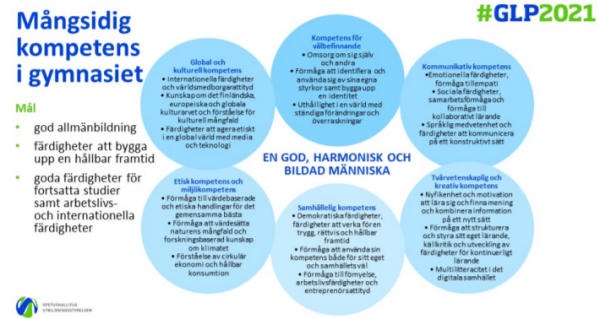 References to the Curriculum for Vörå samgymnasium-idrottsgymnasium 2021 regarding ecological sustainability:
References to the Curriculum for Vörå samgymnasium-idrottsgymnasium 2021 regarding ecological sustainability:
For each theme area, there are references from the curriculum in each subject where the theme area can be reflected.
Here are references to the theme area Values in the subjects philosophy, history, religion, visual arts, study guidance, psychology, and social studies.
Then there are references to the theme area Consequence Thinking (choice of: food, clothes, means of transportation, hobbies) in the subjects biology, philosophy, physics, and music.
THEME: VALUES
"Philosophy teaches the student to conceptually structure values, norms, and meanings."
The goals related to values are:
- "Be able to analyze the meaning of their life and life choices using philosophical concepts."
- "Be able to analyze and assess actions from an ethical perspective and clarify their own moral decisions and values based on philosophical ethics."
- "Be able to apply ethics to societal and environmental issues."
The goals related to values are:
- "Acquire skills to develop a worldview that values human rights, equality, democracy, and a sustainable lifestyle, and be able to act as a responsible citizen who promotes these."
- Well-being Competence: "[...] students develop ethical thinking, empathetic ability, and skills to consider other people and their perspectives and needs."
- Communicative Competence: "Key to history studies is learning to encounter, understand, and accept different ways of thinking and working. The ability to listen to and understand others, and to argue in a way that respects others' viewpoints, promotes not only the student's learning but also their social skills and ability to cooperate. Empathy develops while everyone’s sense of inclusion and experience of a positive learning environment is enhanced."
- Societal Competence: "History teaching emphasizes the importance of human rights, equity, and equality in a way that supports the student's societal competence."
The goal related to values is:
- "Develop the ability to build an ecologically, economically, socially, and culturally sustainable future and to act as an active and responsible member of society."
- Competence for Well-being: "[...] supports one's self-awareness and respect for oneself and others. The teaching provides students with materials and tools to build and evaluate their own identity, worldview, and philosophy of life."
- Communicative Competence: "The teaching uses methods that enhance students' social skills and ability to collaborate and empathize."
- Societal Competence: "By developing students' understanding of religions and worldviews and their ability to engage in dialogue about these subjects, the course provides skills for building societal peace and an ecologically, economically, socially, and culturally sustainable future."
- Ethical Competence and Environmental Competence: "The subject of religion explores the ethical dimensions of religions and encourages students to reflect on values and ethical issues on a personal level."
"In the teaching, aesthetic, ecological, and ethical values within art and other visual culture are studied."
The goals related to values are:
- "Understand the significance of art, the environment, and other visual culture in one's own life, society, and the global world."
- "Build one's cultural identity by producing and interpreting various images."
- Competence for Well-being: "The studies provide tools to respect and appreciate the individual's and the community's cultural diversity."
Interdisciplinary and Creative Competence: "The work typical of the arts encompasses various ways to explore, express, present, and act." - Societal Competence: "[...] examines the values and meanings expressed by visual culture, for example, in built environments, objects, media, and art. The student is encouraged to take a stand and participate in social debate and contribute to sustainable development."
- Ethical Competence and Environmental Competence: "[...] using visual expression, students explore ethical and ecological issues concerning the environment, society, and the global world. The student is guided to reflect on their own choices, solutions, and actions from a sustainability perspective. The studies deepen knowledge about the sustainable use of different materials and techniques."
- Global and Cultural Competence: "The student is encouraged to build their identity and to appreciate their living environment and its cultural heritage."
"Philosophy teaches the student to conceptually structure values, norms, and meanings."
The goals related to values are:
- "Understand the impact that the values, perceptions, and people who are important in one's life have on choices and decisions."
- Competence for Well-being: "[...] support their self-awareness and respect for themselves and others. The teaching provides students with materials and tools to build and evaluate their own identity, worldview, and outlook on life."
- Communicative Competence: "The teaching uses methods that enhance students' social skills and ability to collaborate and empathize."
- Societal Competence: "By developing students' understanding of religions and outlooks, and their ability to engage in dialogues about these topics, the subject provides skills to build societal peace and a sustainable future—ecologically, economically, socially, and culturally."
- Ethical and Environmental Competence: "The subject of religion explores religious ethical dimensions and encourages students to personally reflect on values and ethical issues."
"Studies in psychology provide tools to understand the differences in human values, attitudes, and behaviors."
The goals related to values are:
- "Able to acquire psychological knowledge through various sources of information and assess the reliability and validity of the information."
- "Able to evaluate the potentials, limitations, and ethical aspects of psychological research as well as apply research knowledge and think critically."
- Communicative Competence: "The teaching in psychology supports the student's identity building and provides them with the means to reflect on their own mental well-being and make decisions that support it."
- Ethical Competence and Environmental Competence: "Studies in psychology provide tools to understand the differences in human values, attitudes, and behaviors. The content in psychology increases understanding of the significance of worldviews for human thinking and actions, which supports the development of the student."
"The general goals for teaching social studies relate to the importance, values, and attitudes of social studies, understanding societal phenomena, and seeking and applying society-related knowledge."
The goals related to values are:
- "To develop a democratic understanding of society based on a sense of responsibility, respect for equality, and appreciation for diversity."
- "To understand how different factors influence the formation of one's own societal perspective."
- "To become motivated to deepen one’s interest in social issues and enhance understanding of their significance."
- Communicative Competence: "[...] actively participate in society and influence democracy to promote common well-being."
- Societal Competence: "The student practices acting in a world characterized by complex information and information influence. The teaching deepens the student's diverse societal competence by strengthening their democratic skills. Social studies encourage the student to engage in societal activities and work towards promoting a safe, just, and sustainable future, both as a Finnish citizen and EU citizen, and even globally."
- Ethical Competence and Environmental Competence: "In social studies, the emphasis is on the individual's value-based and ethical actions for the common good, taking into account social responsibility."
"We address emissions of nutrients, acidifying substances, greenhouse gases, CFCs, environmental toxins, and their consequences. We also look at climate change and the ozone layer. Finally, we tackle issues related to sustainable development."
The objectives linked to consequence thinking are:
- "Able to assess and analyze one's own activities considering ecological sustainability."
- Ethical and Environmental Competence: "Knowledge about nature, biodiversity, and the threats to biodiversity is essential to understand our impact on nature and the importance of working towards sustainable development."
- Global and Cultural Competence: "In this study section, many environmental problems, whose causes and mechanisms are global, are addressed."
"Philosophy teaches the student to conceptually structure values, norms, and meanings."
The goals associated with consequential thinking are:
- "Be able to analyze the meaning of one's life and life choices with the help of philosophical concepts."
- "Be able to analyze and assess actions from an ethical perspective and clarify one's own moral decisions and values based on philosophical ethics."
- "Be able to apply ethics to social and environmental issues."
"The teaching guides the student to take responsibility for their own actions and the environment, to use their knowledge in physics to build a sustainable future, and to evaluate their own choices considering sustainable use of natural resources, impacts on the environment and health, and various forms of energy production."
The goals related to consequential thinking are:
- "Acquiring skills to participate in debates and decision-making concerning the environment and technology."
- Social Competence: "The teaching enhances the student's social competence by providing the skills necessary to participate in societal debates and influence collective decision-making."
- Communicative Competence: "The student's own investigative work develops their work methods, collaboration skills, and critical thinking ability, as well as inspires them to pursue studies in physics."
- Ethical Competence and Environmental Competence/ Global and Cultural Competence/ Well-being Competence: "The teaching conveys the importance of physics in building a sustainable future: physics is needed in developing new solutions and ensuring the well-being of the environment and people at local, national, and international levels. The teaching guides students to take responsibility for their actions and the environment, use their physics knowledge to build a sustainable future, and evaluate their choices with consideration of sustainable use of natural resources, environmental and health impacts, and different forms of energy production."
"Musical activities develop an understanding that imagination and the ability to visualize are important human qualities. They allow us to see things differently, think in new ways, and solve practical problems. Imagination is also crucial for environmental competence. An ecological imagination helps the student see alternative choices and weigh the consequences of their actions from a sustainability perspective."
The goals related to considering consequences are:
- "To be able to use musical and other artistic expressions in their community engagement."


